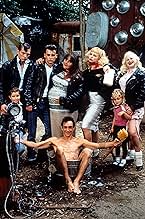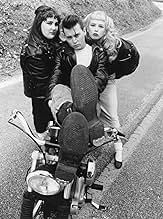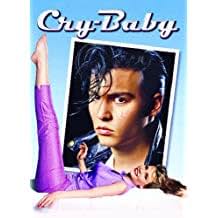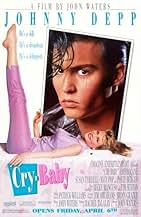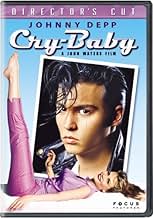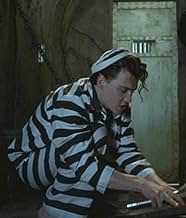Um garoto com um coração de ouro conquista o amor de uma boa menina, cujo namorado busca vingança.Um garoto com um coração de ouro conquista o amor de uma boa menina, cujo namorado busca vingança.Um garoto com um coração de ouro conquista o amor de uma boa menina, cujo namorado busca vingança.
- Direção
- Roteirista
- Artistas
Avaliações em destaque
The film centers around two teens named "Cry-Baby" Walker (Johnny Depp), and Allison Vernon-Williams (Amy Locane), who disturb Baltimore society by breaking the subculture taboos, while also having to overcome their affectionate love and how their actions affect the town. From the start, the basis of the film's social commentary is the difference in classes, with Walker's group being labeled as drapes and Allison's group being labeled as squares. In depicting the squares as social elites and the drapes as white trash rednecks, the film could have easily gone in a sourly dark direction. Thankfully, Waters knows how to execute the fun out of a concept like this and turn it into a full blown campy musical. By exaggerating the stereotypes of '50s rock culture, the film subverts specific tropes, such as Cry Baby being the tough motorcyclist with a heart of gold and Allison's square boyfriend Baldwin being a monster disguised as a charming gentleman. Of course, the chemistry between Cry Baby and Allison is cute in its own right, but the sexual tension between them is what brings audiences back for more.
However, what arguably makes the movie a lot more engaging are the supporting characters. Although mostly derived from their basic traits, Cry Baby's gang/family give out the best laughs in the whole movie. Thanks to an all star cast like Ricki Lake as Cry Baby's boisterous pregnant sister Pepper, Susan Tyrell as Cry Baby's eccentric grandmother Ramona Rickettes, Iggy Pop as Cry Baby's hysterical uncle Belvedere, Traci Lords as the fed up hot Wanda Woodward, Kim McGuire as the ugly clown Mona "Hatchet Face" Malnorowski, etc, the characters serve the story enough with some heavily sprinkled cartoony gags to boot. Even for a film like this, it allows for the occasional piece of drama to spew out with a dynamic split between the drapes and squares without going too far in the pathos department. The pacing is very fast paced, almost never stopping to take a breath, which is exactly what a movie as nutty as this needs. While it doesn't delve into the prejudice happening in Baltimore of the past as deeply as the likes of Hairspray, it's one heck of a comedic thrill ride.
As for the musical highlights, the soundtrack consists of already existing rock hip hop songs from the 50s and songs intended for the movie alone. Since the film barely lets two minutes go by without a musical number, it practically tells the story through the soundtrack, emphasizing the camp punk culture of yesteryear still beloved by Baltimorians today. The choreography alone is incredible, paying tribute to early rock cinema and the outlandishly bold musical numbers they would boast to move the story along. Some of the songs are so poignant that even a single entitled Teardrops Are Falling emphasize why our titular character is called Cry Baby from the start On top of that, the production design and specific editing choices recreate the look of a comically silly 50s feature brought into the early 1990s (most likely why the movie wasn't a hit at the time). Perhaps in bringing his influences in campy rock & roll cinema into the mainstream three decades after the fact was more of a curse on Waters' part, but looking back now, this film delivers on that for all to cherish from that time period alone.
So even if its outlandishly cartoony tone won't please everyone in the world, Cry Baby remains a delightfully infectious musical ode to the teen rebel genre. As both a tribute and a lampoon of the types of films that inspired it, there's a lot to recommend to audiences who are yet to check it out. If you're discovering the later mainstream works of John Waters, this might be a really good place to start, at least before Hairspray and Serial Mom. Lastly, regardless of what you think of Johnny Depp and Amy Locane nowadays, this film will forever remain a cult classic in spite of them more so because of them.
This movie involves two groups: the "squares" and the "greasers". While most teen movies set in the 50's involve typical preppy high school students, this one was on the side of the greasers. This is what I found fun and interesting. The world in which the greasers live is fun and colorful. The characters are all social outcasts or "delinquents" as they call them in the movie. This is what is so particular. Maybe this isn't what life in the 50's was really about, but it gives the illusions that you're seeing an aspect of life during that time that you normally don't see.
It was a pleasant and fun to watch movie. It was also very cartoony, which is something I like in a movie very much. The imagery is very pleasant. However, it's not a movie for everyone. It can easily be seen as cheesy. And if you're expecting a typical 50's musical like Grease, there's a good chance you won't like this one, since it makes you root so much for the social outcasts. This movie doesn't show the typical "clean" 50's that people enjoy so much.
This movie also makes fun of the typical "bad boy" image of the 50's. But doesn't it also poke fun at the image that Johnny Depp had at the time? In several interviews done after the release of this movie, Depp mentioned that he enjoyed playing that role because it was a satire of the image he had and that he also disliked very much.
I think this is the type of movie that can easily become someone's favorite but that can be hated by a lot of viewers. Maybe the dancing and the singing isn't as good as in Grease. But you have to remember that this is a light and fun movie that doesn't take itself seriously. It can also be seen as a satire of typical musicals. I would definitely recommend it.
Baldwin (Stephen Mailer), Alison's ex-boyfriend, does everything in his power to keep Alison to himself and away from Cry Baby. He picks fights and gets his gang together to vandalize the drapes property.
Alison's grandma (Polly Bergen) is like the leader of the squares and in the beginning worries that Cry Baby will be the downfall of her grandchild. Since she is left with Alison's care, she is over protective; but she wants Alison happy more than anything. In the end she comes around and tells Alison to choose the man her heart loves.
I believe director John Waters made a new twist to Shakespeare's Romeo and Juliet, and this provides a happy ending. Through his movie, Waters tells us that love happens when it happens and that no matter what background we come from, we should fight for love with all our hearts.
I love this movie. The first time I saw this movie as a four year old girl, I said I was going to marry Cry Baby. I recommend this movie to everyone. It has action for men and romance for women. I think that it transports us back in time and helps us see the conferences of the two social classes and feeds our belief that love really can conquer it all. I have probably watched this movie a thousand times and will probably watch it a thousand more. It definitely is worth the eighty-five minutes it takes to watch.
Você sabia?
- CuriosidadesTo find a young actor for the role of Wade "Cry-Baby" Walker, director John Waters bought thirty dollars worth of teen magazines, all of which showed Johnny Depp of Anjos da Lei (1987) on the cover. Depp thought the script was funny and strange, and took the offbeat role to avoid being typecast as a television teen idol.
- Erros de gravaçãoThe tattooed teardrop on Cry-Baby's face at the end of the movie appears and disappears.
- Citações
Cry-Baby: That's right, Allison. My father was the "Alphabet Bomber." He may have been crazy, but he was my pop. Only one I ever had.
Allison: God. I heard about the Alphabet Bomber. Bombs exploding in the... in the airport and barber shop...
Cry-Baby: That's right. All in alphabetical order. Car wash... drug store... I used to lay in my crib and hear him scream in his sleep..."A,B,C,D,E,F,G... BOOM! BOOM!"
Allison: But your mom...
Cry-Baby: My mother tried to stop him. She couldn't even spell, for Christ's sake, but they fried her too.
- Cenas durante ou pós-créditosThe film begins with an old-fashioned 50's style Universal logo. It's also accompanied by 50's doo-wop music. A stage curtain opens up the movie.
- Versões alternativasThe USA cable network version has a few extra scenes, including two extra songs, "Chicken" and "The Naughty Lady of Shady Lane":
- Hatchetface's parents selling cigarettes by the school
- Toe-Joe's does a "work-with-me" spiel instead of thanking his "Nudie Cutie"
- an added act of a flexible little girl in the RSVP charm school talent show
- extra footage of Hatchtface chasing Snaredrum and Susie Q around Ramona's front lawn
- Lenora's "gunboats" are now "goldmines"
- The third verse of Allison's song, "Teenage Prayer," is included
- Extra footage of Cry-Baby driving his motorcycle to the charm school, a cop chasing him and an air raid drill that interupts Allison's act
- Cry-Baby combs his hair instead of adjusting his crotch when he gets off of his motorcycle;
- "Lay That Pistol Down" dance number is included
- Cry-Baby arrives during "So Young" instead of before the song beginning, as in video version
- In the movie, Hatchetface says, "Ain't ya got tits? Stick 'em out for God's sake!" In the USA Network version, she says, "Ain't ya got a figure? Show it!"
- There is a longer scene with Wanda, her parents, and Inga, the Swedish exchange student
- The showdown is at Turkey Point instead of at the press conference in front of the prison
- Trilhas sonorasKing Cry Baby
Written by Doc Pomus and Dave Alvin
Performed by James Intveld
Additional vocals by Rachel Sweet
Produced by Dave Alvin
Principais escolhas
- How long is Cry-Baby?Fornecido pela Alexa
- What are the differences between the Theatrical Version and the Director's Cut?
Detalhes
- Data de lançamento
- País de origem
- Idioma
- Também conhecido como
- Llora nena
- Locações de filme
- Empresas de produção
- Consulte mais créditos da empresa na IMDbPro
Bilheteria
- Orçamento
- US$ 11.000.000 (estimativa)
- Faturamento bruto nos EUA e Canadá
- US$ 8.266.343
- Fim de semana de estreia nos EUA e Canadá
- US$ 3.004.905
- 8 de abr. de 1990
- Faturamento bruto mundial
- US$ 8.266.655
- Tempo de duração1 hora 25 minutos
- Cor
- Proporção
- 1.85 : 1
Contribua para esta página



